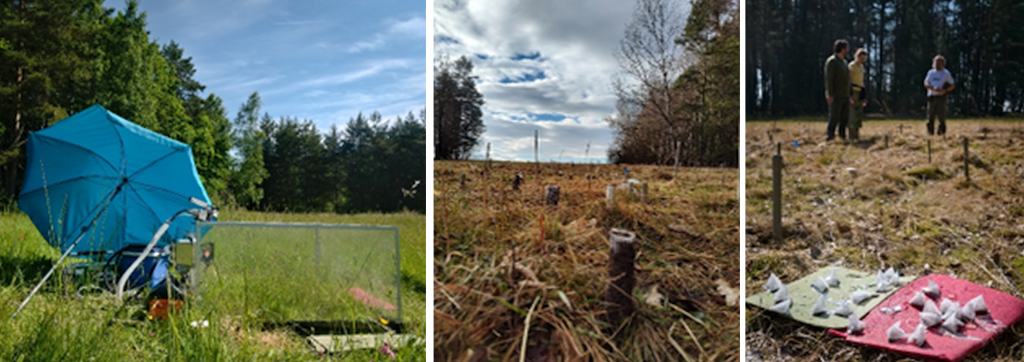Throughout April, we are featuring the articles shortlisted for the 2022 Harper Prize. The Harper Prize is an annual award for the best early career research paper published in Journal of Ecology. Jules Segrestin’s article ‘Towards a better ecological understanding of metacommunity stability: A multiscale framework to disentangle population variability and synchrony effects‘ is one of those shortlisted for the award.
👋 About me
I grew up on Reunion Island, a relatively small tropical island in the Indian Ocean. Although I wish I could say that I was fascinated by nature as a child, I must say that I didn’t realize how special nature was on the island until I moved to Europe and started learning about botany, plant science and ecology.
My interest in plant science emerged during my internships and travels around the world, from the Mediterranean climate of southern France to the maritime temperate climate of New Zealand, to the tropical climate of French Guiana. A few years later, in 2018, I was awarded a Ph.D. in functional ecology in Montpellier, France. I continued with a one-year teaching and research position at the University of Lyon, France, followed by a postdoc position at the University of South Bohemia, Czech Republic.
Briefly, my research focuses on plant adaptation to different sets of environmental conditions and their effects on ecosystem properties, through the lens of comparative analysis and trait-based ecology. I have studied plant reproductive phenology, leaf resource use management, plant defenses, growth patterns and many other aspects of plant functioning, mainly on terrestrial and aquatic herbaceous plants. To do so, I often combine experimental approaches (fieldwork, common garden experiments) and analyses of large datasets (synthesis of trait data from independent studies, use of databases). I am therefore very sensitive to innovative field activities, but I also enjoy R programming and biostatistics. I consider myself a motivated and meticulous person, I like teamwork and I am always curious to explore new topics and create collaborations.
🔎 The shortlisted article
The article ‘Towards a better ecological understanding of metacommunity stability: A multiscale framework to disentangle population variability and synchrony effects’ investigates the temporal stability of a metacommunity of temperate meadows. This work results from my post-doctorate in the Czech Republic during which I had to quickly acquire new knowledge on community ecology (particularly on stability), identify the limits of recent work, and develop new concepts. In this study, we adapted and extended recent analytical tools to provide a better understanding of the ecological mechanisms underlying stability. Our analytical framework is based on a set of ecological hypotheses (summarized in Table 1 in the main text) that are expected to drive the level of synchrony between pairs of populations at different spatial and organizational scales. More precisely, we aim at testing the effects of mechanisms such as species annual responses to environment, demography, and interactions, on the metacommunity stability, using new synchrony indices that, conversely to previous work, are not affected by statistical properties of the metacommunity. We applied this framework to a unique data set describing the sorted biomass of individual plant populations, across 12 permanent plots of a species-rich meadow for 16 years (Figure 1). The communities were sampled in different treatments of fertilization and dominant removal to evaluate the effect of environmental heterogeneity on stability.

Overall, our study is particularly important to the field for two main reasons: first, it provides a new analytical framework that can be applied to metacommunities from a wide range of ecological contexts and promises a better understanding of metacommunity stability. The upscaling from the community to the metacommunity level allows a more realistic description of ecosystem functioning by considering the indirect or absence of interactions between spatially distant populations. Second, the results obtained from the species-rich meadow contribute to improving our current understanding of the effect of meadow management on the stability of net primary productivity. In this system, we found counterintuitive results regarding the effect of environmental heterogeneity on population synchrony and revealed the prevalent effects of individual population stability and portfolio effect on the overall metacommunity stability.
🌿 What’s next?
This year, I was awarded a grant from the national agency for research in the Czech Republic to build my research team and develop a new project for the next three years. The project builds on the set-up of unique experiments in species-rich grasslands of South Bohemia (Czech Republic) and the collection of original data. We aim to investigate the effects of plant diversity on a comprehensive set of ecosystem properties related to the carbon cycle (Figure 2). Besides testing the consequences of species loss on carbon pools and seasonal fluxes, the project integrates a trait-based framework to improve our mechanistic understanding of the underlying ecological processes.

Find Jules on Twitter, ResearchGate and Google Scholar.
Read the full list of articles shortlisted for the 2022 Harper Prize here.


